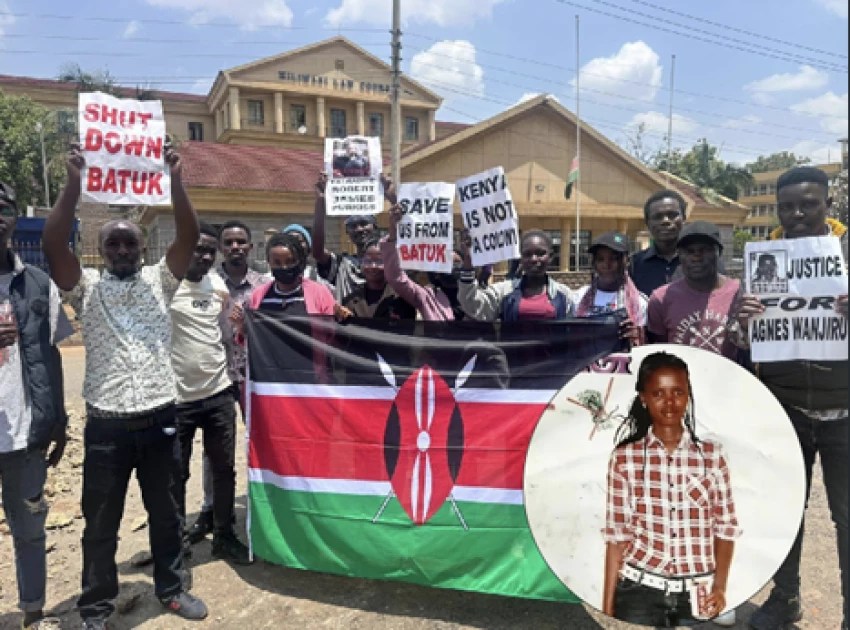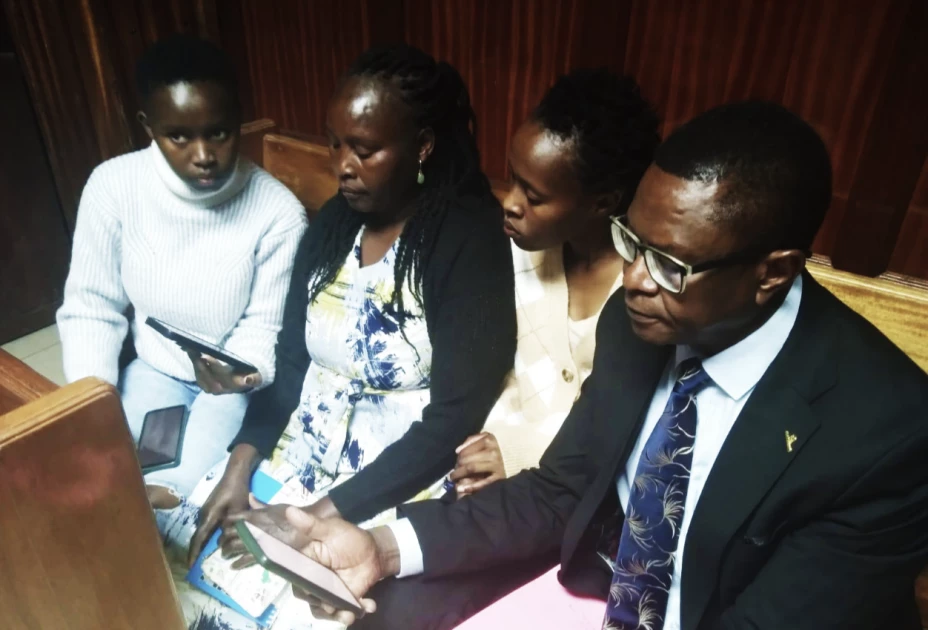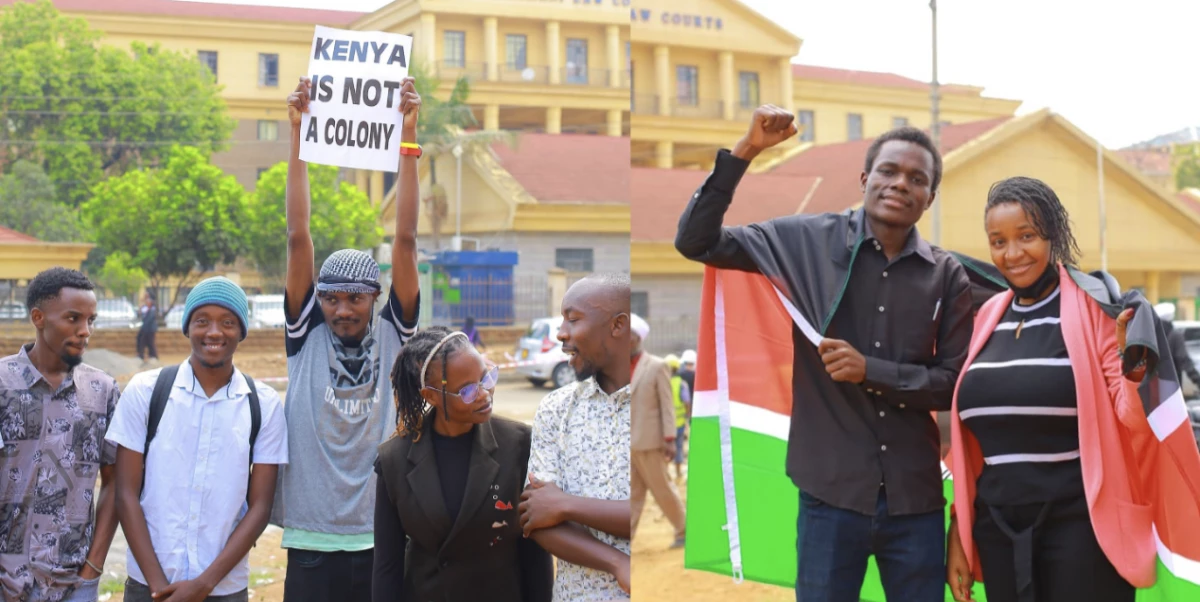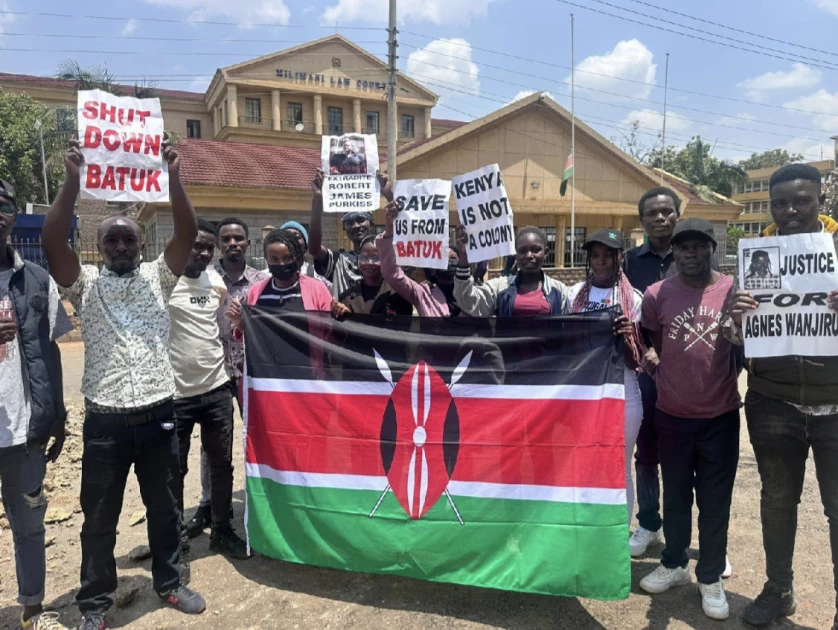sponsored content
"We are not our parents": Why Gen Z care about British colonialism and demand justice for Agnes Wanjiru #AD

Protests for Agnes Wanjiru (insert)

Audio By Vocalize
On the morning of October 21, young Kenyans grouped outside the Milimani Law Courts, holding placards that read “Justice for Agnes Wanjiru”, “Kenya is not a colony”, and “Shut down BATUK.”
Their chants echoed across the courtyard not just as a demand for one woman’s justice, but as a collective cry from a generation tired of congenital silence.
For many of them, Agnes Wanjiru’s story is not just about one murder; it is a mirror reflecting how deeply the shadow of British colonial influence still lingers in Kenya.
Inside the courtroom, the proceedings were systematic and controlled. On September 16, Justice Alexander Muteti issued an arrest warrant for former British soldier Robert James Purkiss, accused of murdering Wanjiru in 2012.
A month later, on October 21, the Office of the Director of Public Prosecutions formally initiated the extradition process, notifying the Attorney General to write to the UK government.
Wanjiru’s niece, Esther Njoki, who had earlier travelled to London to meet British officials, returned home with cautious optimism.
But despite these developments, the road ahead remains uncertain. Extradition between unequal partners has never been easy, and few in Nairobi expect London to readily surrender one of its own.

Officially, BATUK exists to train British troops and strengthen military cooperation. Unofficially, many Kenyans view it as a relic of empire, a modern instrument of neocolonialism that continues to operate with near-total impunity.
Its soldiers come and go under diplomatic protection, while the local communities are left to deal with the consequences.
Over the years, BATUK has been linked to multiple scandals. There have been reports of sexual assaults committed by its personnel, environmental damage, such as the Lolldaiga fire that destroyed thousands of acres, and the persistent danger of unexploded ordnance left behind in training zones.
For many residents, the British military presence has been less about “partnership” and more about a foreign power exercising privilege on Kenyan soil.

The heart of the problem lies in the 2021 Defence Cooperation Agreement between the UK and Kenya. The document grants British soldiers extraterritorial rights, meaning they can only be tried in British military courts, even for crimes committed in Kenya. This arrangement, many argue, undermines Kenya’s sovereignty and leaves victims without justice.
“The Kenyan government will need to exert its sovereignty, which must be respected by the UK government”, says political scientist Gedion Onyango. “Currently, DCA is being applied in a bilateral relationship of unequal partners, and there are slim chances of addressing perennial issues, a sign of more intricate challenges in the future”.

For Kenya’s youth, these aren’t abstract diplomatic issues. They are deeply personal. They see in Wanjiru’s case a reflection of everything that has been denied to their parents’ responsibility, dignity, and self-determination.
“The Gen Z of Kenya are the voice for the voiceless”, said young political journalist Juma G.
“They say the dead tell no tales, and it is Gen Z to speak on their behalf. The fight for Agnes Wanjiru by Gen Z has shown that this is a generation willing to rewrite history. West African countries are doing it, cutting ties with France. If they are doing it, why not the Gen Z of Kenya? It can be done. They are able and capable of liberating this country from British colonialism. The Gen Z are showing Britain that they are not superior to Kenyans and that they are not like their parents”.
The crowd that gathered outside the courthouse wasn’t large, but it was passionate. Students, artists, activists, and young professionals came together united not by ideology, but by the shared sense that justice delayed for Wanjiru is justice denied for Kenya.
Many of them had never met her family, yet they felt personally connected to her story. “We want Kenyan women to be protected,” one young woman said, holding a handmade sign.
“The British still think that we are their colony, and we must show them that this is not the case. Ensure safety for Kenyan women and a fair trial for the murderers, or shut down BATUK”.

For now, the case is back in the hands of lawyers and diplomats, but the public mood is shifting. The more the process drags on, the louder the calls for sovereignty and accountability grow.
“As protests against BATUK personnel’s criminal activities and the Unit’s overhandedness build up locally,” political scientist Gedion Onyango noted, “it is only a matter of time before they become politically significant. A future generation, both in Kenya and the UK, may not be willing to accommodate the arrangement, which could potentially lead to demands for radical and elaborate changes within the DCA framework”.
Agnes Wanjiru’s murder has become more than a legal case; it has become a generational moment. For many young Kenyans, this is the line in the sand.
They want a country that stands on equal footing with its former coloniser, one that protects its people and demands justice without fear or apology. And in the name of Agnes Wanjiru, they are determined to make sure the world knows it.


Leave a Comment